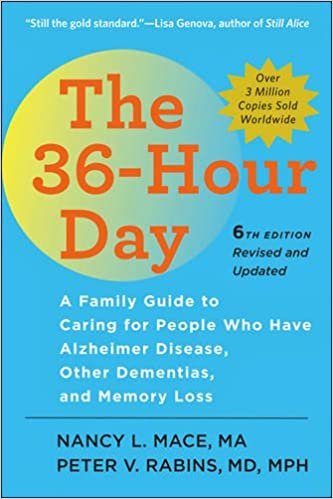
The 36-Hour Day: A Family Guide to Caring for People Who Have Alzheimer Disease, Other Dementias, and Memory Loss*.
When our St. John’s dementia caregivers and our friends taking care of dementia persons at home agree on a useful book, we believe it’s worth calling to your attention as a resource.
The 36-hour Day is such a book. It’s a thorough review of dementia care oriented towards home caregivers. It not only covers the basics in easy-to-understand language, it also includes a lot of tips and techniques for dealing with all levels of dementia from Mild Mental Impairment to advanced stages. This comprehensive book sets the stage for caregivers with a description of the disease of dementia, what to expect (with many examples) as the disease progresses, and tips for coping with the more difficult behaviour attitudes and characteristics along the way. It also discusses dementia care legal and financial issues, family relations, the need for respite care and the value of support groups, and offers resources for finding out more. And the book offers a special section written for children and teenagers affected by a loved one with dementia.
To give you a taste of just how valuable a resource this book can be, here are some notable quotes:
On building joy into your caring, both for you and your loved one, “The person who has dementia is still a person. He needs and enjoys a good laugh too. You may both be able to laugh when something goes wrong… A frequent characteristic of dementia is that personality and social skills appear nearly intact while memory and the ability to learn new information are being lost… Look for ways to simplify activities so that a person can continue to be involved within the limits of his abilities (the person who can no longer fix a whole meal may still be able to peel the potatoes).”
On persuading a reluctant bather, “Oh, look at this lovely bath water. As long as it is here, why not take a bath? It would be terrible to waste it.”
On taking precautions against ‘wandering,’ “Have a “memory-impaired” bracelet made now if there is any possibility that the person will wander or get lost.”
On explaining to other family members, “It is surprising how often accurate information reduces the tensions between family members… Small children frequently relate well to people who have dementia and can establish special and loving relationships with them.”
And on considering a move to a nursing home, “Federal law mandates that nursing homes have an individual care plan for each resident. Ask to see the plan and do your best to attend care plan meetings.”
The 36-Hour Day is available in paperback and Kindle electronic edition at Amazon
*Mace, Nancy L., & Rabins, Peter V., The 36-Hour Day: A Family Guide to Caring for People Who Have Alzheimer Disease, Other Dementias, and Memory Loss (A Johns Hopkins Press Health Book). Johns Hopkins University Press.
Nancy L. Mace, MA, is currently teaching dementia care internationally. She has been a consultant to the Office of Technology Assessment, U.S. Congress, and to the Alzheimer’s Association, and she was an assistant in psychiatry and coordinator of the T. Rowe and Eleanor Price Teaching Service at the Department of Psychiatry and Behavioral Sciences of the Johns Hopkins University School of Medicine.
Peter V. Rabins, MD, MPH, is professor emeritus of psychiatry and medicine at the Johns Hopkins University School of Medicine. He was the founding director of its geriatric psychiatry program and the first holder of the Richman Family Professorship of Alzheimer Disease and Related Disorders.








